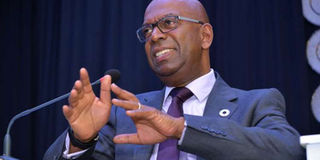Investing in community only way to sustain businesses: Safaricom CEO, Bob Collymore

Safaricom Chief Executive Officer Bob Collymore. PHOTO | FILE | NATION MEDIA GROUP
What you need to know:
In a recently released report, the commission said empowering communities via provision of education, health facilities and enabling individuals start income generating projects created a ready source of ‘customers’ for corporate companies’ product thereby helping drive profits via, higher sales and more jobs to meet the rising demand.
Safaricom’s CEO Bob Collymore who is also among the 35 commissioners selected to drive the inclusive corporate agenda said companies need to shape the next generation by investing in projects that improve lives of people within regions they operate in.
Company chief executives drawn from Kenya and other parts of the world have resolved to adopt a people-first strategy saying sponsoring social projects was good business.
The newly formed Business and Sustainable Development Commission which met in Davos, Switzerland on the sidelines of the just ended World Economic Forum said corporate firms have a role to improve society and create a lasting purchasing power among the local populace.
In a recently released report, the commission said empowering communities via provision of education, health facilities and enabling individuals start income generating projects created a ready source of ‘customers’ for corporate companies’ product thereby helping drive profits via, higher sales and more jobs to meet the rising demand.
Safaricom’s CEO Bob Collymore who is also among the 35 commissioners selected to drive the inclusive corporate agenda said companies need to shape the next generation by investing in projects that improve lives of people within regions they operate in.
“Business has the obligation to be an active part of a more responsible and inclusive society. We can drive the right conversations to promote sustainable change for communities as we are at a critical nexus that will shape the way we work, live and play in generations to come,” he said.
The Commission’s Mark Malloch-Brown said the finding called on leaders to urgently adopt news ways of doing business where business look at the long term good and not on short term profit matters which alienates societies but provides companies with a fast growth curve that has proved unsustainable in the long-term.
“This report is a call to action to business leaders. We are on the edge and business will drive more political opposition giving us an economy that simply does not work for enough people. We have to switch tracks to a business model that works for a new kind of inclusive growth,” he said.
The report, entitled ‘Better Business, Better World’ proposed that companies must tackle in-house environmental degradation activities and contribute towards environmental conservation among other projects that help build resilient communities.
The report adds that multinationals and other corporate companies should open a new growth strategy where they delegate some tasks to small and medium enterprises in their value addition processes thereby creating more jobs within local communities.
Singling out investments made in energy, cities, agricultural production and in health, the report said these investments could unleash jobs and higher revenues for governments thereby creating a more inclusive society where the main task is to fulfil individual tasks for national good.
The Commission resolved to mobilise all corporate companies to sign a voluntary social contract with governments as well as society representatives so as to win loyalty among the local populace where they operate.
“ The recently released 2017 Edelman Trust Barometer reinforces this idea. It shows that while CEO credibility is sharply down, 75per cent of general population respondents agree that a company can take specific actions that both increase profits and improve the economic and social conditions in the community where they operate in,” said the statement.
Mr Collymore said that this could best be carried out under the commission’s recommendations and actions outlined in the ‘Better Business, Better World’ report that champions rebuilding trust by creating decent jobs, rewarding workers fairly, investing in the local communities and paying a fair share of taxes.
“At a time when our economic model is pushing the limits of our planetary boundaries and condemning many to a future without hope, the Sustainable Development Goals offer us a way out,” said Unilever’s Chief executive Paul Polman adding that the response should be swift, decisive and collective to ensure the gains made target the lowly in society.
The commission launched at the World Economic Forum in Davos Switzerland brings together leaders from business, finance, civil society, labour, and international organisations seeks to create a global prize with the twin aims of mapping the economic prize that could be available to companies if the Global Goals are achieved, and describing how they can contribute to achieving them.





